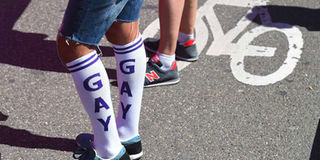Don’t decriminalise homosexuality

Activists take part in the 16th local edition of the homosexual, bisexual and transgender visibility march - Gay Pride - in the eastern French city of Strasbourg on June 10, 2017. PHOTO | PATRICK HERTZOG | AFP
What you need to know:
- Western countries and agencies have over the years been funding pro-gay groups and pushing for the legalisation of homosexuality.
- The registration of the local gay rights group is akin to recognising an organisation that promotes the rights of consumers of cocaine and other hard drugs.
- To force poor Third World countries to legalise same-sex relationships, Western nations are now tying development aid to gay rights under the guise of anti-discrimination laws.
Over the years, there have been subtle and covert programmes aimed at promoting and pushing for the legalisation of homosexuality in the country.
The latest development, where the National Gay and Lesbian Rights Commission has gone to court to seek the decriminalisation of homosexuality is the boldest by Western-funded gay lobby groups to promote homosexuality-- a practice considered to be an immoral and abhorrent behaviour by the vast majority of Kenyans.
Western countries and agencies have over the years been funding pro-gay groups and pushing for the legalisation of homosexuality.
Astraea Lesbian Foundation for Justice and Tides Foundation, which are among the leading organisations that promote Lesbian, Gay, Bisexual and Transgender (LGBT) rights in Third World countries are among the main financial backers of the Kenyan gay rights movement.
FELONY
They are now emboldened and have headed to the courts in a bid to change the laws to have the practice legalised. Under our laws, homosexuality is considered a felony that attracts a jail sentence of 16 years. It is inconceivable that the government could even consider registering an organisation that promotes illegal practices.
The registration of the local gay rights group is akin to recognising an organisation that promotes the rights of consumers of cocaine and other hard drugs. During his visit to Kenya in 2015, former US President Barack Obama called for the recognition of gay rights, but his appeal was quickly spurned by President Uhuru Kenyatta, who described the matter as “a non-issue”.
He affirmed that Kenyans would protect their inalienable religious and cultural values and would not succumb to Western pressure to embrace practices that go against beliefs held dear by Kenyans.
To force poor Third World countries to legalise same-sex relationships, Western nations are now tying development aid to gay rights under the guise of anti-discrimination laws. In Uganda, President Yoweri Museveni, who had come out strongly against homosexuality was arm-twisted to relax laws as the US and other Western countries threatened to cut aid if Uganda enacted strong anti-gay legislation.
ABHORRENT BEHAVIOUR
Just over four decades ago, homosexuality was seen as an abhorrent practice around the world with many countries, including the US and several European nations, outlawing the practice.
It was largely seen as a psychiatric problem. However, a small but highly influential gay lobby succeeded in driving an agenda that the practice is not only a natural sexual orientation, but also a human right that should be legalised and promoted globally.
Many countries subsequently embraced homosexuality and some went on to enact legislation to sanction same sex marriages. Voices against LGBT have largely faced strong opposition and even sanctions by increasingly powerful gay lobby groups.
The gay agenda is now being taken right into classrooms to infuse the habit among nascent and naive minds. Unknown to many, homosexuality is covertly being pushed in Kenya under the guise of Comprehensive Sexual Education (CSE), where learners are to be taught that two adults of the same sex can constitute a family, live together and raise children just like other parents.
SEXUAL ORIENTATION
The premise that homosexuality is a natural sexual orientation and consensual conjugal relations by adults in their private sphere should not be subjected to interference has been used as the reason to push for legalisation. Yielding to this argument also implies that incest by consenting adults should be accepted.
Already, there are plans to push for the legalisation of incest among consenting adults. In 2014, Germany’s national ethics council called for an end to the criminalisation of sex between siblings.
If such calls gain strength, incest, considered in all societies across the globe as an immoral, abhorrent and unacceptable practice, could be legalised.
Kenyans, majority of whom subscribe to the Christian and Islamic faiths and African religious traditions, are against this practice that contravenes teachings in the Bible and the Quran.
The efforts of the Kenya Christian Professional Forum to take legal steps to oppose attempts to decriminalise homosexuality are commendable.
Kenyans should join hands to resist the blind importation of practices that threaten to pollute religious and cultural values that they hold dear to their hearts.
Mr Abusufian is head of media at Jamia Mosque, Nairobi. [email protected]





